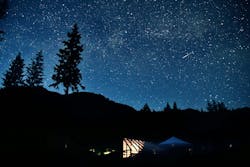The best insurance to protect one's home against the damage of extreme weather events? Don't buy a home in an area vulnerable to natural disasters.
In the fall of 2018, the United Nations released its special report on global warming of 1.5 degrees Celsius, "an ear-splitting wake-up call to the world," concluding that if no action is taken, greater effects of climate change will be felt by 2040, a destabilization including more fires, extreme heat, droughts, food shortages, floods, and disease, that is expected to prompt a run on land in the Northern hemisphere.
Additionally, the U.S. government released a report in October 2018 stating that the effects of climate change is on pace to destroy 10 percent of the American economy by 2100. In turn, many young professionals are crafting a Plan B, The New York Times reports. Similar to the efforts of billionaires like Peter Thiel, these professionals are buying land and homes in safe zones out of the way of fire, flood, and other people.
Bruce Riordan, program director for the Climate Readiness Institute at the University of California Berkeley, cautioned that it isn’t realistic to expect to live in a bubble. “Sure, you can grow your own vegetables, but what about wheat and grains?” he said. “And what happens when you need medical attention?”
A better strategy, Mr. Riordan suggested, would be to find a community that is intelligently preparing for whatever climate change may bring. He equated the situation to what California has done about earthquakes: They can’t be avoided, but we can build safer buildings, get better at predicting them and establish systems to care for vulnerable populations when they occur.
